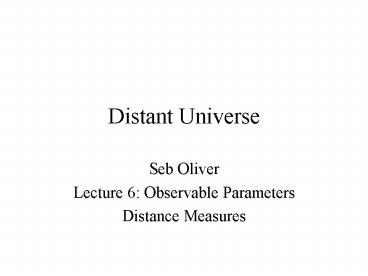Seb Oliver - PowerPoint PPT Presentation
1 / 34
Title:
Seb Oliver
Description:
Galaxy Evolution. The Hunt for the First Galaxies. Background Light. Structure Formation ... The microwave background and Primordial Abundances. Observable ... – PowerPoint PPT presentation
Number of Views:54
Avg rating:3.0/5.0
Title: Seb Oliver
1
Distant Universe
- Seb Oliver
- Lecture 6 Observable Parameters
- Distance Measures
2
Main Topics
- Standard Hot Big Bang Model
- Classical Observational Cosmology
- Galaxy Evolution
- The Hunt for the First Galaxies
- Background Light
- Structure Formation
3
Classical Observational Cosmology
- Observable Parameters
- Distances
- Classical Tests
- The microwave background and Primordial
Abundances
4
Observable Parameters
- Redshift
- Hubble Constant and Hubble Parameter
- Deceleration (acceleration?) parameter
5
Redshift --- z
maintaining convention that x0 is now
How do we relate z to scale factor?
Three ways
6
Redshift
7
Redshift --- Balloon analogy
8
Redshift --- R-W metric
5
Photons travel along paths with ds 0
Consider a photon travelling along a path which
we choose to have dj 0
9
Redshift --- Energy
Number density of particles
in thermal equilibrium or where no interactions
photon numbers are conserved
Energy density of particles
10
Hubble Constant and Hubble Parameter
Hubble constant can be observed locally as we
shall see later e.g. below
Hubble parameter more difficult.....
11
Deceleration parameter
Taylor expansion
defining a deceleration parameter q0
12
Deceleration parameter
8
Recall acceleration equation
If p 0
recall too
in this case measuring q0 would thus give us W0
13
Deceleration parameter
if we have a Cosmological Constant L term
if we can assume the Universe to be flat i.e.
So in the presence of L a measurement of q0 alone
is insufficient to determine W some additional
theoretical or observation constraint is required
14
Classical Observational Cosmology
- Observable Parameters
- Distances
- Classical Tests
- The microwave background and Primordial
Abundances
15
Distances
- Redshift
- Co-Moving Distance
- Proper Distance
- Luminosity Distance
- Angular-Diameter Distance
16
Redshift
zz3
z0
zz2
zz1
17
Co-Moving Distance/separation
- Much the easiest to work with
- Once you have defined your co-moving positions
separations etc. they stay fixed! - Not directly related to measurable quantities
- Since redshift is an important measure of
distance from us to objects it is important to
see how co-moving separation relates to z
18
Robertson Walker Metric
Various alternative forms
4a
4b
4c
5
N.B. definitions of r are not equivalent between
these two forms
6
5/6
4
19
Co-moving distance vs z
If we know the cosmology we can relate the
co-moving distance to the redshift using the
Robertson-Walker metric
Differential form
Matter dominated models
Integral form
20
Proper Distances
Proper sizes are related to co-moving sizes by
the scale factor
The co-moving system is defined to be such that
co-moving separations today are proper
separations
It can be confusing to talk of proper distance
meaning the distance from us to an object because
the Universe has expanding while the photon
travelled
Warning
21
Distances vs Cosmologies
- Proper distance R0Sk as a function of cosmology
- Matter dominated, L 0
- Matter Radiation, L 0
- L ? 0
22
Distances vs Cosmologies
- It can be shown from consideration of the
derivation of redshift in the R-W metric and
consideration of the Friedman Equation for matter
dominated Universes (L0) - Hence also luminosity and angular-diameter
distances (DL, DA) - ? Ideally measuring distances would give cosmology
23
Distances vs Cosmologies
- A similar (equally nasty) expression can be
derived if radiation is also present, see
hand-out sheets - If L ? 0 an analytical expression for R0Sk is not
possible, must be determined numerically - However
to second order
Again we see that geometric measures can give q0
but will not give W, unless we assume an equation
of state
24
Luminosity Distance
25
Bolometric Luminosity
A major goal of astrophysics will be to explain
the energy (E) that celestial bodies emit
Joules, J
Most of this energy is emitted as light
In physics the rate at which energy is emitted is
called power, P
Watts, W J s-1
The rate at which celestial bodies emit energy
via light is called bolometric luminosity (L)
Watts, W J s-1
26
Flux (Euclidean)
Flux is the amount of energy per second passing
through a unit area
DA
Watts / metre2, W m-2
DE/Dt
When one is some distance away from a source
which emits isotropically the bolometric
luminosity L is distributed over a sphere
27
Flux (Cosmological)
N.B. using the co-moving distance as we want the
size of the sphere today
photons loose energy
interval between photons increases
28
Luminosity Distance
Cosmological Flux
Want this to look Euclidean
Defined Luminosity Distance DL
29
Angular Diameter Distance
30
Angular Diameter Distance
Proper size of an object
N.B. R(t)Sk not R0Sk as we want separation when
photon emitted
31
Angular Diameter Distance
By analogy with Euclidean
Where we have defined the angular diameter
distance
32
Surface Brightness
Would like a measure of energy per unit area on
the sky
Surface brightness (B) Flux per unit solid angle
independent of distance
33
Surface Brightness and Olbers paradox
- In an infinite Universe every line of sight will
eventually end on a star - Since in a Euclidean Universe the surface
brightness is constant the night sky should be as
bright as a typical star e.g. the sun - However, the night sky is dark!
- Possible resolution ...
34
Surface Brightness
Surface brightness is flux per unit solid angle
Independent of cosmology!
35
Surface Brightness and Olbers paradox
- Possible resolution ...
- The surface brightness is not constant, but
decreases as (1z)4































